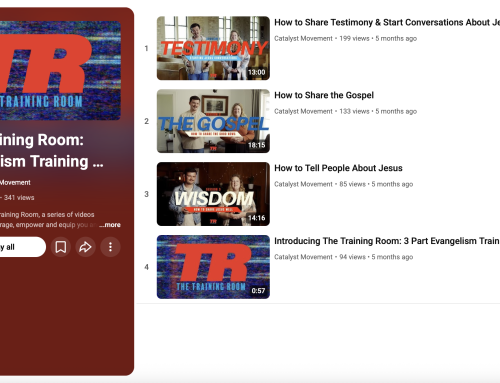For a number of years I mentored a group of Christian students who met weekly during lunchtime in a school classroom. I hope what I share here encourages you to believe that you can make a difference.
What the group aimed to achieve each school term
Basically, the goals every TERM (four terms per year) were
- Connect and pray: The group would reconnect and pray, looking to God for ideas.
- Learn: They’d then consider areas to learn in – like conversational skills to help each person in their conversations about spiritual things with friends.
- Topics as outreach: They’d plan a couple of discussions on interesting topics – purposed to intrigue other students to come and join a discussion about a spiritual topic.
- An event as outreach: They’d try to run a fun programme of some kind in a lunch hour that would be entertaining, while building bridges in it to Christian ideas (stories / short testimonies / interesting facts and data included as interesting communication), or invitations to local combined youth events.
What came about as a result
In short, about 25 students from a range of youth groups attended weekly. Thy got permission to include a reminder about the group in the daily classroom announcements. Through these they were able to highlight topics being discussed or fun programmes being run on the relevant days.
When it came to the programmes, the goal was fun – with very short messages / stories / invitations related to hope and faith. Doing one or two of these per term means you need maybe six to eight ideas for a year — but a good programme idea can be repeated many times!
- For example, one programme ideas was ‘Who dares wins’ – with crazy things that youth were dared to do (though nothing too dangerous).
- This one programmes could be run time and again, because the entertainment wasn’t just in the game idea – but in the different reactions of different people when involved in it. It was fun to watch and laugh at!
- This is worth noting — because one good programme idea can help you attract a crowd multiple times – while sharing brief positive / hope-filled stories and invitations in the mix! (This is harmless as far as the school is concerned – while important, because hope matters!)
Where and how big?
Sometimes the group ran programmes in the drama room with up to 50 people. Other times we ran them in the school hall with up to 500! The size depended on how good the programme idea was, how good the promotion was, and the growing reputation of the group.
For example, one time we married two students in the hall to discuss the benefits of marriage. I’ll tell you about that one in another blog. It was fun – and those two both (who weren’t actually then married) were so brave! (Can you imagine the joking going on around the school after that??!).
Of course – sensitivity was needed in all of this. Relationship with teachers and the Principal is needed. Wisdom in how things are said is needed – always building hope, raising questions, extending invitations – while avoiding getting too ‘heavy’.
The result was bridges built – which resulted in conversations opening up for many – and youth then more interested to join wider youth group and combined youth group activities.
The point of a programme
It’s important to know WHY you run a programme.
- If it’s just games – is that worth it??
- As an idea, including even simple invitations, building the ‘brand profile’ of your youth groups, begins to give it another layer of meaning.
- Sharing short thoughts, stories and testimonies takes it further
- While preaching the full Christian message is only sometimes appropriate.
- I am suggesting that the primary goal is to START God-conversations!
- These conversations can then continue elsewhere.
- (If you don’t first start them – how can they continue elsewhere? This is the point of it! This is what is achieved!)
Topical example: Consider how suicide and mental health issues have been on the rise. Why? The fact is homes are broken, and youth are being consistently told the lie that their existence is accidental through evolution. Broken homes hurt, and youth aren’t dumb — that’s why many are struggling for hope! In the midst of this we have a message of hope. What is that message? Let me tell you my story. (This is how the Christian message worked personally for me). “There is hope here if you want it. You are loved by God. Every person is valuable. There is always hope!”
- To note, sin, separation from God, judgement and salvation aren’t explained in the above in detail.
- The point is the START the conversation – while INVITING them to continue it somewhere else.
So, in respectful yet clear ways you can,
- share short testimonies,
- say short prayers/karakia,
- share short thoughts (or messages) with interesting data or an interesting illustration,
- In response: Invitations would be extended to other youth group or combined-youth events happening in weekends,
- Christian literature or weblink that are relevant might be offered – while again knowing your place. (Sometimes it’s not appropriate to give something to everyone in a school – even if its available for people to take for free at the front afterward.)
…and the whole programme and through would be all over within about 20 minutes (or 30 at the most).
With creativity — plus relationship and trust with teachers and Principals – plus a respectful manner, large group programmes are possible!
A quick comparison to Asia
Because I did just happened to to get to apply the same principles for 9 years in Asia, the difference where I was was that there couldn’t be an official school group. Youth had to run their social groups in lunchtime or after school. They might never get a classroom to do this. So it was more about small group activities, meeting for sports after school etc… leveraged to engage conversations, shared stories and extend invitations. E.g. Josh calls out to Ben, ‘What’s happening at your youth group this weekend?’ Their conversation while taking their football boots off sparks interest. Friends then decide they want to come too… Etc. Yet this could be just as INTENTIONAL – catalysing the same conversations and interest.
See elsewhere a blog/article on the ‘Jesus Club’ in Christchurch. It’s another current example of the same principles -gathering a crowd, building bridges, starting conversations – extending invitations. The distinction in the ‘Jesus Club’ approach is that it is (a) consistently in one classroom and (b) specific in Christian messages (no gentle big ‘connection events’ like above). https://godtalk.nz/ideas
What could you do?




